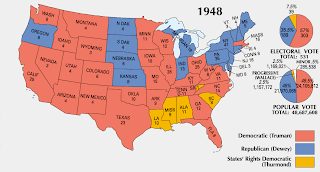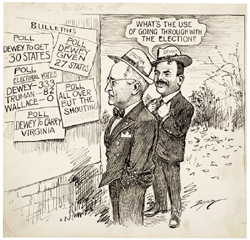 New York Times political correspondent James Reston once wrote: "Personality is a force in American politics equally as strong as principle, and ... the American people have always loved a fighter."
New York Times political correspondent James Reston once wrote: "Personality is a force in American politics equally as strong as principle, and ... the American people have always loved a fighter."
Truman, trailing in the polls, decided to adopt a slashing, no-holds-barred campaign. He ridiculed Dewey by name, criticized Dewey's refusal to address specific issues, and scornfully targeted the Republican-controlled 80th Congress with a wave of relentless, and blistering, partisan assaults. He nicknamed the Republican-controlled Congress as the "do-nothing" Congress, a remark which brought strong criticism from GOP Congressional leaders (such as Senator Taft), but no comment from Dewey. In fact, Dewey rarely mentioned Truman's name during the campaign, which fit into his strategy of appearing to be above petty partisan politics.
And also, he embarked on a 31,000-mile train trip across the nation and delivered hundreds of off-the-cuff speeches to crowds. “Give 'em hell, Harry,” was a popular slogan shouted out at stop after stop along the tour.
On civil rights, Truman issued executive orders desegregating the military and ending discrimination in the civil service. No longer beholden to southern Democrats (who supported Strom Thurmond's Dixiecrat candidacy), Truman could finally issue these long-promised initiatives that doubtlessly pleased blacks and liberals, two important segments of the Democratic Party.
 Truman's victory came about because he won the support of most of
Truman's victory came about because he won the support of most of 



